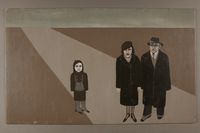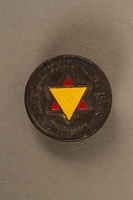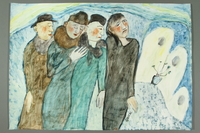Overview
- Description
- Five studio photographs depicting siblings of Rifka Musafia Pollak; Efraim, Solci, Rahela and Menashe.
- Credit Line
- United States Holocaust Memorial Museum Collection, Gift of Dina Pollak Gabos
- Collection Creator
- Dina Gabos
- Biography
-
Dina Pollak was born on January 11, 1938, in Zagreb, Yugoslavia [Croatia], to Otto and Rifka Musafia Pollak. Otto was born on January 21, 1899, in Zagreb, to Samuel and Johanna Schneid Pollak. Rifka was born on December 1, 1906, in Bijeljina, Yugoslavia, to Meir and Sara Elazar Musafia. Rifka had eight siblings: Blanka, Isak, Rachela, Johanna, Solci, Efraim, Menashem, and Salamon. Otto was a lawyer and an active Zionist. Rifka was a language teacher and seamstress. The family was Jewish and lived in Zagreb.
On April 6, 1941, the Axis powers, Germany, Italy, Hungary, and Bulgaria invaded Yugoslavia and divided it amongst themselves. The Pollak and Musafia families lived in the newly created Independent State of Croatia, controlled by the Ustasa government, which enacted policies to persecute Jews and terrorized the country with the mass slaughter and expulsion of the Serbs. On April 28, 1941, Otto was arrested in Zagreb by the Ustasa police and sent to Kerestinec concentration camp. In June 1941, he was sent back to Zagreb and confined there. Rifka and Dina were in Split at the time. The Ustasa regime issued a travel permit for Rifka and her child, valid for travel from Split to Zagreb from July 4, 1941 to August 4, 1941. In October, Otto, Rifka, and Dina fled Zagreb for Italian occupied Ljubljana, Yugoslavia [Slovenia]. They lived in hiding from October until December 1941, when they escaped to Italy. From January 1942 until September 1943, they lived as confined refugees in Valdobiaddene, Treviso Province. In July 1943, the Allies landed in Sicily and Mussolini was deposed. On September 3, the Italian government reached an armistice with the Allies. The Pollak family obtained false papers and made their way to southern Italy as Ottone, Ria, and Dina Pollan, hiding from the occupying German troops. The region they were living in liberated in July 1944, as Allied forces advanced north of Rome. After liberation, they lived in Bari, Italy, in the Santa Croce displaced persons camp.
On April 11, 1950, the family boarded the US Navy ship General J H McRae in Bremerhaven, Germany. They arrived in New York on April 24, 1950, and settled in New York City. They learned that Rifka’s mother and siblings were all killed during the war. Rachela and her husband Salamon Alkalaj were deported from Bijeljina and killed in 1941. Their son, Mosho, was shot in Bijeljina for fighting Nazis. Sara and Johanna were sent to Djakovo concentration camp, where Sara was killed and Johanna died of typhus in 1942. Johanna’s husband, Menachem Albahari, had been killed in Jadovno concentration camp in 1941. Solci was deported from Brno, in German occupied Czechoslovakia and killed in Treblinka. Solci's husband Hugo Pollak was killed in Brno. Rifka’s remaining siblings and their families were all deported and killed. Rifka and Otto became naturalized American citizens on June 13, 1955, and Dina did also on February 27, 1956, shortly after her eighteenth birthday. Dina became an artist and married Andre Gabos. Otto, age 83, died on January 22, 1982. Rifka, age 87, died on August 11, 1994.
Physical Details
- Language
- Czech
- Genre/Form
- Photographs.
- Extent
-
1 folder
Rights & Restrictions
- Conditions on Access
- There are no known restrictions on access to this material.
- Conditions on Use
- Material(s) in this collection may be protected by copyright and/or related rights. You do not require further permission from the Museum to use this material. The user is solely responsible for making a determination as to if and how the material may be used.
Administrative Notes
- Holder of Originals
-
United States Holocaust Memorial Museum
- Legal Status
- Permanent Collection
- Provenance
- The papers were donated to the United States Holocaust Memorial Museum in 2012 by Dina Pollak Gabos, the daughter of Rifka Musafia Pollak.
- Record last modified:
- 2024-07-11 07:47:49
- This page:
- https://collections.ushmm.org/search/catalog/irn78322
Download & Licensing
- In Copyright - Use Permitted
- Terms of Use
- This record is not digitized and cannot be downloaded online.
In-Person Research
- Request 7 Days in Advance of Visit
- Plan a Research Visit
-
Request in Shapell Center Reading Room
Bowie, MD
Contact Us
Also in Dina Pollak Gabos collection
The collection consists of a contemporary painting and photographs relating to the experiences of Dina Pollak Gabos, and her parents Otto and Rifka Pollak, who escaped Yugoslavia in 1941 and lived in hiding in Italy until 1944. Accretion: Painting: by Dina Gabos (donor); acrylic on paper; titled: “Sorrow”; dated: 1982; 28x19.5”; Calendar: issued by Jewish National Fund (Keren Kayemet L’Israel) for the Hebrew year 5710 (1949-1950); with images of symbols of the State of Israel; map of the State of Israel and a list of new settlements founded by JNF in Israel. In Italian; Membership ID: issued by The Zionist Organization in the South of Italy to Rifka Pollak, donor’s mother; dated” July 1, 1945 in Hebrew and English; Photographs: depicting a group of Jewish Holocaust survivors posing with the sign “HIAS of America” on their way to Palestine; dated: 1945; Bari, Italy and a makeshift synagogue in Bari, Italy in 1945; Invitation: to luncheon for State of Israel Bonds and meeting the Foreign Minister of the State of Israel, Golda Meir; dated: December 9, 1956; New York City, US; Pin: with two enamel triangles, red and yellow, forming a Star of David; with a Hebrew inscription: “Association of Former Prisoners of Nazis in Israel” Some of these materials may be combined into a single collection in the future.
Date: approximately 1930-1977

Autobiographical painting depicting a young girl and her parents as refugees in flight painted postwar by a Croatian Jewish woman
Object
Grayscale painting created by Dina Pollak Gabos in 1977, commemorating her family’s escape from Yugoslavia to Italy in December 1941. The Axis powers invaded Yugoslavia on April 6, 1941. Dina, age three, and her parents Otto and Rifka lived in Zagreb, which became part of Croatia and was ruled by the fascist anti-Semitic Ustasa regime. On April 28, Otto was sent by the Ustasa police to Kerestinec concentration camp, but was released in June. In October, the family fled to Italian controlled Ljubljana. They lived in hiding until they escaped to Italy in December 1941. The family lived as confined refugees in Valdobiadenne, Italy, from January 1942 until September 1943, when Italy was occupied by Germany after the Italians surrendered to the Allies. The Pollak family acquired false papers and fled to southern Italy. They were freed in July 1944, then lived in Santa Croce displaced persons camp in Bari. Rifka’s mother, eight siblings, and their families were all murdered in Croatia during the war. In 1950, Dina and her parents emigrated to New York.

Pin
Object
Dina Gabos papers
Document
Documents: permit to travel issued to Rifka Pollak and her child by the Ustaša regime in Croatia in July 1941; telegram sent by Golda Myerson (Meir) to the Association of Yugoslav Jews in US in May 1948 asking for funds to bring surviving Jews of Europe to Israel; Photographs: Rifka and Otto Pollak (donor’s parents); studio photograph of Dina dedicated to her aunt Blanka, dated May 6, 1940; portrait of Johana and Isak Albahari (donor’s maternal aunt and her husband) who were murdered in Djakovo camp in Croatia in 1942; copy of painting by Dina Gabos depicting herself and her parents on the run in Italy during the Holocaust
Dina Pollak Gabos papers
Document
Calendar: issued by Jewish National Fund (Keren Kayemet L’Israel) for the Hebrew year 5710 (1949-1950); with images of symbols of the State of Israel; map of the State of Israel and a list of new settlements founded by JNF in Israel. In Italian; Membership ID: issued by The Zionist Organization in the South of Italy to Rifka Pollak, donor’s mother; dated” July 1, 1945 in Hebrew and English; Photographs: depicting a group of Jewish Holocaust survivors posing with the sign “HIAS of America” on their way to Palestine; dated: 1945; Bari, Italy and a makeshift synagogue in Bari, Italy in 1945; Invitation: to luncheon for State of Israel Bonds and meeting the Foreign Minister of the State of Israel, Golda Meir; dated: December 9, 1956; New York City, US




